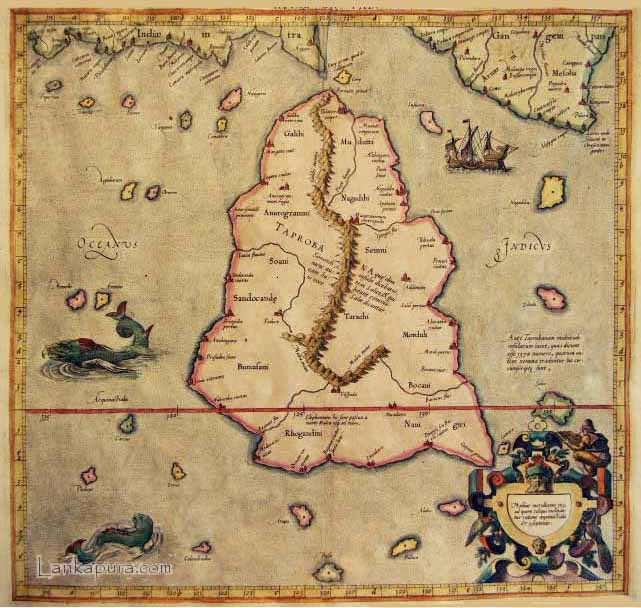"Sri Lanka, as the Buddhist chronicles of Sri Lanka mention that a port city called Tammapanni was established there during the reign of the legendary king Vijaya. The city was called "Tammena" during the reign of Vijaya's successor Panduvasudeva and "Tammapanni" during the reign of Ashoka's missionary son Mahendra. According to these chronicles, the place was so called because its dust stuck to Mahendra's skin, making him appear copper-coloured. The name was subsequently applied to the entire island of Sri Lanka.
According to one theory, "Taprobane", an ancient Greek name for Sri Lanka, is derived from the word "Tamraparni". The name may be a reference to the "copper colored" shores of Sri Lanka, and may have entered Greek via the Pali "Tambapanni". Megasthenes, a Greek ambassador to Ashoka's grandfather Chandragupta, describes Taprobane as being separated from the mainland by a river, and as being "more productive of gold and large pearls than India." This seems to be a reference to Sri Lanka. In the world map drawn by the ancient Greek (Claudius Ptolemaeus "Geographia", 150 CE), a huge island located south of the Indian subcontinent is referred to by the Greek as "Taprobane", which modern historians identify as the island of Sri Lanka.
Taprobana (Latin: Taprobana; Ancient Greek: Ταπροβανᾶ), Trapobana, and Taprobane (Ταπροβανῆ, Ταπροβάνη) was the name by which the Indian Ocean island of Sri Lanka was known to the ancient Greeks.
Reports of the island's existence were known before the time of Alexander the Great as inferred from Pliny. The treatise De Mundo, supposedly by Aristotle (died 322 BC) but according to others by Chrysippus the Stoic (280 to 208 BC), incorrectly states that the island is as large as Great Britain (in fact, it is only about one third as big). The name was first reported to Europeans by the Greek geographer Megasthenes around 290 BC. Herodotus (444 BC) does not mention the island. The first Geography in which it appears is that of Eratosthenes (276 to 196 BC) and was later adopted by Claudius Ptolemy (139 AD) in his geographical treatise to identify a relatively large island south of continental Asia. Writing during the era of Augustus, Greek geographer Strabo makes reference to the island, noting that "Taprobane sends great amounts of ivory, tortoise-shell and other merchandise to the markets of India.". Eratosthenes' map of the (for the Greeks) known world, c. 194 BC also shows the island south of India called Taprobane.
Stephanus of Byzantium writes that a metropolis of the island was called Argyra (Ancient Greek: Ἀργυρᾶ, "Silver"). and that also there was a river which was called Phasis.
Aelian wrote that he had heard that the island does not have cities, but 750 villages.
The identity of Ptolemy's Taprobane has been always associated with the present day Sri Lanka from maps of ancient antiquity until the medieval maps of Abu-Rehan (1030) and Edrisi (1154) and in the writing of Marco Polo (1292). Furthermore, most of the place names marked on the map can be identified with place name of the places in ancient Sri Lanka."
from https://en.wikipedia.org/wiki/Tamraparni
and https://en.wikipedia.org/wiki/Taprobana

Ptolemy's Taprobane